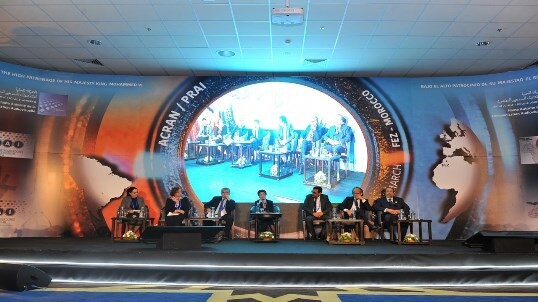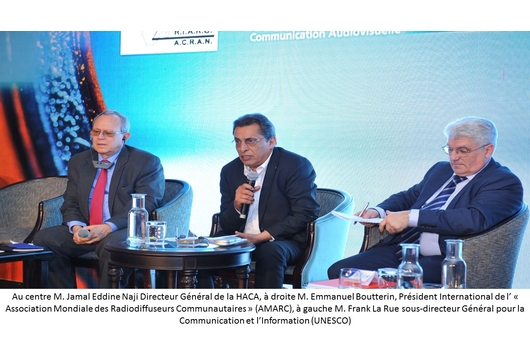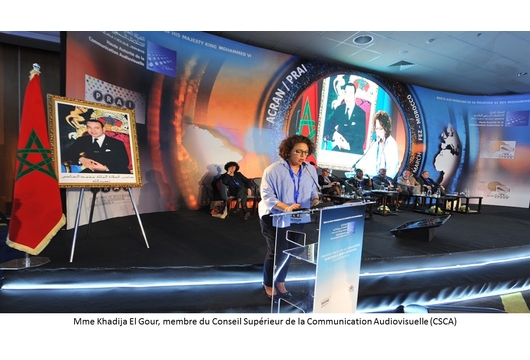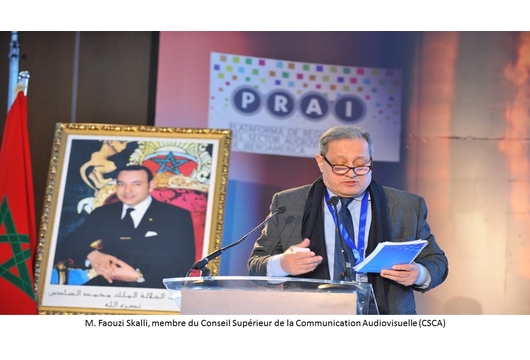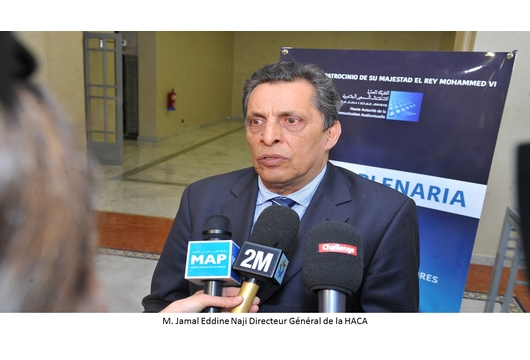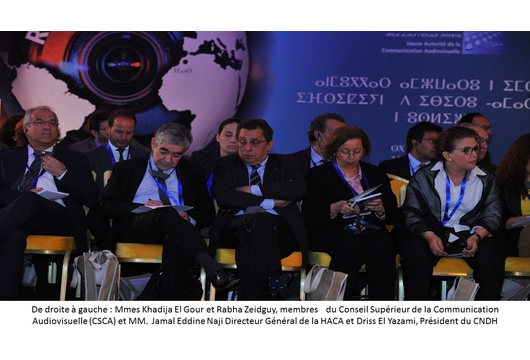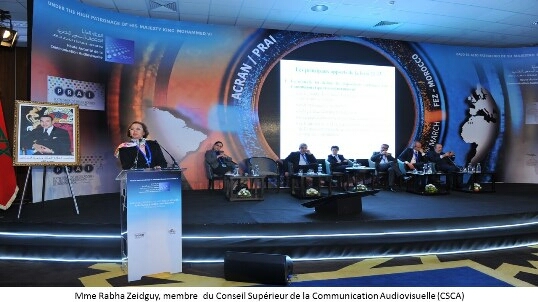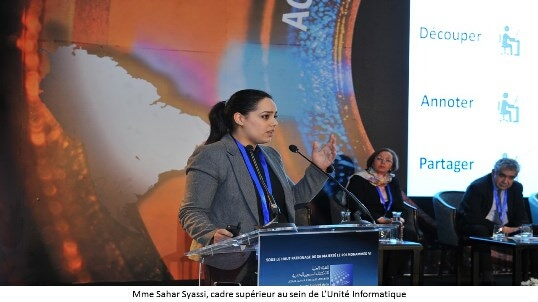Closure of RIARC/PRAI 1st Summit’s work with the adoption of Fez Declaration
- More than 60 members from the two instances took part of the working sessions
- Fez Declaration, a commitment to actively promote best practices in the field of regulation
Working sessions of the 1st Summit of audiovisual media regulation authorities, held in Fez on 16th and 17th March 2017, under the High Patronage of His Majesty King Mohammed VI, and with the participation of 60 members representing 14 authorities in African countries, under the banner of the ACRAN, and 8 from the Ibero-American zone, under the banner of the PRAI, besides Spain, Portugal and France (not to mention representatives of the UNESCO), have been completed with the adoption of Fez Declaration.
In the Declaration, African and Ibero-American audiovisual regulators express their commitment to promote best practices and models of approaches, particularly in the field of audiovisual communication regulation.
This meeting took place in the current context of the media liberalization, that many emerging countries from Africa and Latin America encounter, and the abundance of its correlated economic, cultural and societal issues.
Created in 1998 in Libreville in Gabon, the African Communication Regulation Authorities Network (ACRAN) regroups 35 countries from Africa, while the Ibero-American Platform of Television Regulators (PRAI) gathers a dozen countries from Iberian and Latin American zone. As for the High Authority for Audiovisual Communication, it is an active member of the RIARC since 2005 and an observer member of the PRAI since 2014.
This Summit, considered as an unprecedented international meeting gathering regulators from the two continents, happened to be a unique opportunity for both networks to share experiences, models and standards related to the regulation missions, especially regarding political pluralism and pluralism of currents of thoughts and opinion, cultural and social diversity, gender equity, missions of the audiovisual public service, as well as the regulatory issues raised by associative media, which is a strongly present actor in Africa and Latin America, perceived by the Unesco as the third type of public interest media.
At the opening of the meeting, President of the HACA, Ms Amina Lemrini El Ouahabi pointed out that this 1st Summit represents an initiative through which the HACA is encouraged by “Morocco’s strategic choice for South-South Cooperation, promoted by His Majesty King Mohammed VI, and in compliance with a shared awareness guided by our strengths and challenges, our pathways and experiences in a domain as fabulous, yet complex, as the audiovisual regulation in our world today”. She also added that this “is an opportunity for both networks to share information and experiences, and address, in mutual agreement, problems related to pluralism and linguistic, cultural and social diversity, gender equity, missions of audiovisual public service, fight of gender stereotypes and associative media, third type of public interest media.”
For his part, Director-General of the HACA Mr Jamal Eddine Naji called for a co-regulation system, by stating that for the audiovisual sector in Africa, “we advocate and defend a co-regulation system, as a model and as standards for the future”. He emphasized that the High Authority has already implemented a data bank accessible for all national operators in order to enable the co-regulation system on the basis of the same mutually-shared information.
Mr Naji has also noted that the purpose of the meeting was for the HACA, member of many networks in francophone world, in Mediterranean, African and Latin American countries, to stimulate the interest of all the Atlantic parts to discuss on topics that are after all common to both sides.
President of the HACA of Ivory Coast and current President of the Network of Francophone Media Regulators (REFRAM) Mr. Ibrahim Sy Savané underlined that Fez 1st Summit is an “exceptional” meeting that brings together experts from five continents to discuss on the same topic. He also insisted on the necessity to reach compromises in the aim of implementing regulation norms and standards. In fact, he said: “For shared problems, the solution has to be common as well”.
In his presentation, current President of the PRAI and President of CNTV- Chile, Mr Oscar Reyez-Pena, noted that this meeting was an opportunity to stir up a fruitful debate on issues regarding technological innovation, protection of minors and technology gaps. According to M. Reyez, the purpose of the meeting is to preserve equality of rights, guarantee pluralism in media and protect users.
It is worth recalling the agenda of this two-days meeting, during which members of the Higher Council of the Audiovisual Communication, Ms. Rabha Zeidguy, Ms. Khadija El Gour, and Mrs. Talaa Saoud, Bouchaib Ouabbi, Faouzi Skalli, and Mohammed Abderrahim, have actively participated, includes interventions particularly on “Audiovisual landscapes in Africa and Latin America and the role of regulators”, “Management of political and social pluralism”, “Promotion of equality between men and women in and through audiovisual media”, and “Associative media, the third type of public interest media”.
Furthermore, this Summit has been an opportunity to make a presentation on Moroccan audiovisual landscape and important missions of the HACA, especially in light of the sector’s development and the recent revision of laws regulating the audiovisual communication and the regulatory institution. The general topic was presented to participants by Ms. Rabha Zeidguy, while Ms. Khadija El Gour and M. Faouzi Skalli tackled the issues of political, social and cultural pluralism.
Within the same framework, Presidents and Heads of African and Ibero-American authorities discussed and exchanged ideas with over forty decision-makers of the Moroccan audiovisual field, both public and private media, and international experts invited by the HACA, including the UNESCO Assistant Director-General for Communication and Information, UN former rapporteur for Human Rights, Mr. Frank La Rue.
It is important to note that present delegations of Africa were from: Ghana, that ensure ACRAN's presidency, Cameroun, Burkina Faso, Mali, Niger, Chad, Benin, Guinea, Tunisia, Tanzania, Democratic Republic of Congo, Republic of Central Africa, Ivory Coast and Morocco.
PRAI's representatives came from Catalonia, Andalusia, Spain, Portugal, Mexico, Ecuador, Colombia and Chili, that ensures current presidency of this network.
Fez Declaration, a commitment to actively promote best practices in the field of regulation

